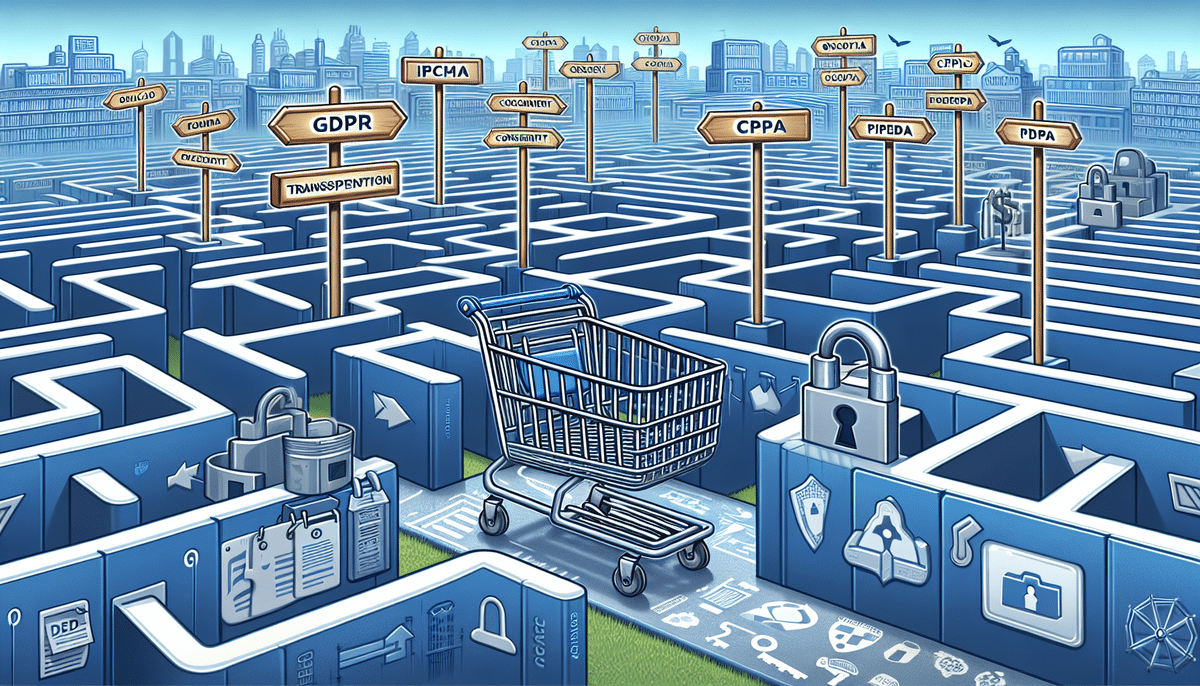Understanding E-Commerce Logistics Compliance
As the e-commerce sector continues to expand rapidly, ensuring e-commerce logistics compliance has become paramount for businesses aiming to meet legal obligations, protect consumers, and foster a fair competitive environment. Compliance in logistics not only mitigates legal risks but also enhances operational efficiency and customer trust.
Importance of E-Commerce Logistics Compliance
Compliance in e-commerce logistics is crucial for both businesses and consumers. Adhering to regulatory standards helps businesses avoid legal repercussions, fines, and reputational damage, while ensuring consumers receive quality products and their personal information remains secure.
Legal Protection
By following established regulations, businesses can avoid hefty fines and legal actions. For instance, non-compliance with data privacy laws like the GDPR can result in penalties up to €20 million or 4% of annual global turnover, whichever is higher (GDPR Official Website).
Customer Trust
Compliance fosters trust among customers by ensuring reliable and secure transactions. According to a Statista report, trust is a significant factor influencing consumer purchasing decisions in e-commerce.
Competitive Advantage
Businesses that maintain compliance can gain an edge over competitors who may neglect these standards. Compliance often leads to operational efficiencies, reduced costs, and enhanced customer satisfaction, positioning compliant businesses as leaders in the market.
Essential Rules and Regulations for E-Commerce Logistics Compliance
E-commerce logistics compliance is governed by a variety of laws and standards designed to protect consumers and ensure fair competition. Key regulations include:
- Consumer Protection Laws: Ensure fair treatment and safeguard consumer rights.
- Data Privacy Laws: Protect consumers' personal and financial information, such as the FTC Privacy Rules.
- Labeling Requirements: Mandate accurate product information, including ingredients, country of origin, and safety warnings.
- Product Safety Standards: Ensure products meet safety criteria to prevent consumer harm.
- Transportation Regulations: Govern the safe and efficient movement of goods, including compliance with the Federal Railroad Administration regulations.
- Customs Laws: Regulate the import and export of goods across international borders.
Businesses must stay informed about these regulations and consult with legal experts to ensure full compliance, thereby avoiding significant fines and legal challenges.
The Role of Technology in E-Commerce Logistics Compliance
Technological advancements have significantly enhanced the ability of businesses to manage logistics compliance effectively. Key technologies include:
- Automated Systems: Facilitate the tracking of product deliveries, ensure proper labeling, monitor fraudulent transactions, and gather data for compliance reporting.
- Supply Chain Visibility: Provides real-time tracking and monitoring, helping identify and address potential issues promptly.
- Process Automation: Streamlines tasks such as inventory management and order fulfillment, reducing manual errors and operational costs.
Advanced compliance tools and software are essential for maintaining adherence to regulatory standards. For example, platforms like ShipScience’s compliance tools offer robust solutions for managing logistics compliance effectively.
Additionally, technologies such as blockchain and artificial intelligence are being integrated to enhance transparency, traceability, and predictive analytics in compliance management (Forbes on AI and Blockchain in Compliance).
Common Challenges in E-Commerce Logistics Compliance
Maintaining compliance in e-commerce logistics presents several challenges, particularly for businesses operating internationally. Common obstacles include:
- Managing Data Privacy and Security: Protecting consumer data against breaches and cyberattacks.
- Keeping Up with Changing Regulations: Adapting to rapidly evolving laws and standards.
- Conducting Proper Risk Assessments: Identifying and mitigating potential compliance risks effectively.
- Managing Cross-Border Shipments: Navigating varying regulations and requirements for importing and exporting goods.
- Ensuring Supply Chain Partner Compliance: Verifying that suppliers, manufacturers, and distributors adhere to relevant regulations.
Overcoming Compliance Challenges
To address these challenges, businesses should:
- Invest in regular staff training on compliance issues.
- Adopt a proactive approach by staying informed about regulatory changes.
- Seek advice from legal and compliance experts.
- Collaborate with experienced logistics providers who understand international trade regulations.
- Conduct regular audits of supply chain partners to ensure ongoing compliance.
Best Practices for Maintaining E-Commerce Logistics Compliance
Implementing best practices is essential for sustaining compliance in e-commerce logistics. Key practices include:
- Regular Risk Assessments: Continuously identify and address potential compliance risks.
- Comprehensive Staff Training: Educate employees on current regulations and compliance standards.
- Accurate Labeling and Packaging: Ensure all products are correctly labeled and appropriately packaged to meet regulatory requirements.
- Maintaining Detailed Records: Keep comprehensive records for compliance audits and reporting purposes.
- Third-Party Compliance Audits: Utilize external audits to verify compliance and identify areas for improvement.
Staying updated with regulatory changes requires businesses to regularly review and update their compliance practices. Engaging with industry associations and attending relevant conferences can provide valuable insights into new developments and best practices.
Effective communication with suppliers and partners is also crucial. Establish clear compliance expectations and guidelines, and regularly update partners on any changes to compliance requirements to ensure collective adherence.
The Benefits of Maintaining E-Commerce Logistics Compliance
Maintaining compliance in e-commerce logistics offers numerous advantages, including:
- Legal Protection: Operating within legal frameworks to avoid costly legal battles and reputational damage.
- Increased Customer Trust: Building trust through reliable and secure transactions, leading to higher customer retention.
- Competitive Advantage: Differentiating from competitors by adhering to compliance standards, which many may overlook.
- Improved Operational Efficiency: Streamlining processes for faster and more accurate order fulfillment.
- Cost Savings: Avoiding penalties and identifying areas for cost reduction, such as optimizing shipping routes and reducing packaging waste.
Compliance not only safeguards businesses but also enhances operational efficiency and fosters customer loyalty, contributing to sustained growth and profitability.
Ensuring Compliance with E-Commerce Logistics Regulations
To ensure compliance with e-commerce logistics regulations, businesses should undertake several key steps:
- Conduct Thorough Research: Understand the regulations and standards applicable to each jurisdiction in which you operate.
- Seek Expert Advice: Consult with legal and compliance professionals to navigate complex regulations.
- Establish a Compliance Management System: Implement systems to monitor and manage compliance effectively.
- Conduct Regular Risk Assessments: Identify and mitigate potential compliance risks.
- Train Staff: Ensure that employees are knowledgeable about compliance issues and practices.
- Stay Informed: Keep up-to-date with changes in regulations by subscribing to industry newsletters, attending conferences, and regularly checking official government websites.
Adopting these strategies enables businesses to proactively manage compliance, thereby avoiding costly penalties and legal issues associated with non-compliance.
The Future of E-Commerce Logistics Compliance: Trends to Watch
The landscape of e-commerce logistics compliance is continually evolving, driven by technological advancements and changing regulatory environments. Key trends to monitor include:
- Blockchain-Based Compliance Management: Enhancing transparency and traceability in supply chains, which can reduce fraud and improve accountability (IBM Blockchain Supply Chain).
- Increased Regulation on Data Privacy: Strengthening protections for consumer data in response to rising cyber threats, with regulations like the GDPR setting global standards.
- Integration of Artificial Intelligence: Utilizing AI for more efficient compliance processes, such as predictive analytics and automated reporting (Forbes on AI in Compliance).
- Sustainability Practices: Implementing eco-friendly logistics operations, including the use of sustainable packaging materials and optimizing delivery routes to reduce carbon emissions (UN Sustainable Development Goals).
Businesses must stay abreast of these trends to maintain compliance and remain competitive. For example, adopting sustainability practices not only meets regulatory requirements but also appeals to environmentally conscious consumers, enhancing brand reputation.
Overall, e-commerce logistics compliance is a critical component of the e-commerce industry. By staying informed about regulatory changes and integrating innovative technologies, businesses can protect their operations, satisfy customers, and secure a competitive position in the market.






















